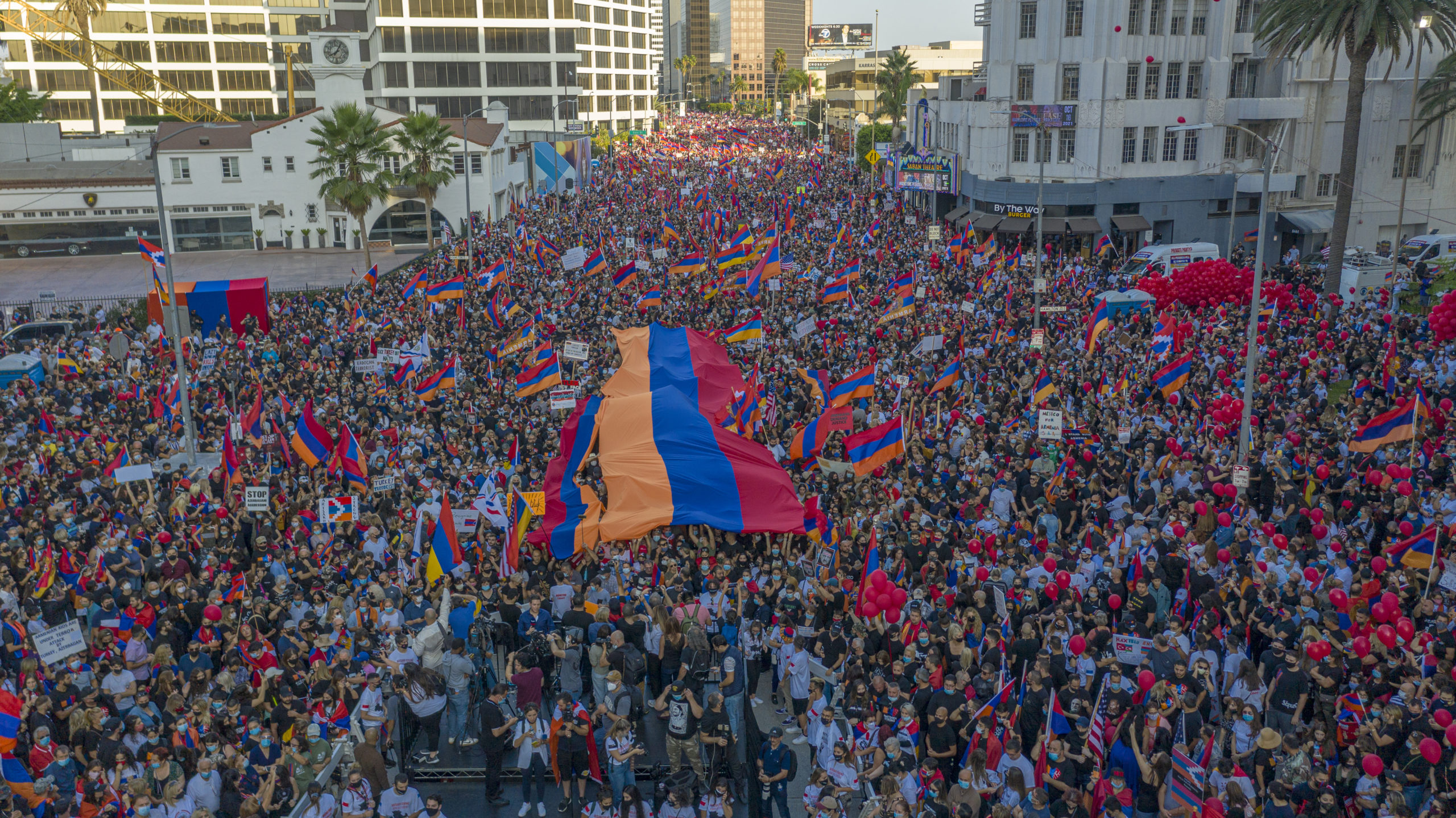[dropcap size=big]I[/dropcap] am writing to you now from Yerevan, Armenia, as a die-hard Angelena and as a passionate daughter of Armenian refugees and genocide survivors. I want to tell you about the month I’ve had and how I am continuously reminded about the importance of building cross-cultural solidarities, no matter where you are in the world.
Of Armenia
As an Angelena of the Armenian diaspora, I exist “in-between” two places that I cherish and call home: Los Angeles and Yerevan. Born in Los Angeles, my love for my city runs deep, but the love I have for Yerevan is something else. Every summer, I peel away from L.A. so that I can exist in Armenia temporarily. For a few months, I get to live in the part of the world I was meant to live in. My flesh and bones know it, too. The food, the energy, the water, the breeze, the land, the people, the mundane things of every day resonate with me. Its drawn borders don’t even include my maternal or paternal ancestral homelands, yet I feel deeply at home in Armenia.
On my maternal side, I am a first-generation daughter of twice-displaced Armenian refugees, once from our homeland in Jugha, Nakhchavan (now occupied by Azerbaijan, a land I can never visit because of my Armenian last name) and again from our host-country, Iran. On my paternal side, I come from Armenian genocide survivors who, as children, escaped massacres and deportations from their indigenous lands of Shabinkarahisar and Antep. Turkey currently occupies both.
Of Diaspora
This is what it is to be of diaspora. I say of diaspora, instead of in diaspora, because I find that diasporaness is not a static place or a singular identity through my experience. It is a state of being; it is to be in constant flux, to be neither here nor there, to both belong and not belong, your body in one place, and your soul in another. It is to be at war. War with two or more identities, war with languages, war with lands you will never know, and ones you wish you didn’t. Violence is the constant in our histories...of why we are displaced and dispossessed, to begin with.
Today, it is safe to say that there is turmoil in both my host and home countries. U.S. state violence has been unleashed onto people who are confronting settler colonialism and anti-Black racism on Turtle Island. And oceans away, Azerbaijani aggression, fortified by “big brother” Turkey, has waged a full-fledged war-like assault, land grab, and ethnic cleansing campaign against indigenous Armenians of the Republic of Nagorno-Karabakh, the lands we Armenians call Artsakh. And they succeeded. This happened all while the world turned a blind eye, distracted by the U.S. elections, with the COVID-19 pandemic raging in the background.
For us, this is not a “conflict” of equal parties or a “dispute” over territory. This is an attempt to ethnically cleanse Armenians from their indigenous lands.
On September 27th, we learned that Azerbaijani forces, backed by Turkey and with weaponry from Israel, began bombing Armenian cities and towns in Artsakh’s autonomous region. For Armenians all across the globe, our lives came to a complete standstill. It paralyzed us. Artsakh has historically been part of Armenia for centuries, and the Armenians there have been advocating for their independence for over 100 years.
For the fascist dictatorial regimes of Azerbaijan and Turkey, this attack is one of imperialist territorial expansion. Because of the impunity afforded by the international community, Turkey and Azerbaijan are now set to completely destabilize the region without so much as a slap on the wrist.
For Armenians, this has become a fight for self-determination and for the right to exist. Armenians, who carry inter-generational trauma from the Armenian Genocide and from the multiple anti-Armenian progroms and massacres that took place in Azerbaijan, know precisely what this attack means.
For us, this is not a “conflict” of equal parties or a “dispute” over territory. This is an attempt to ethnically cleanse Armenians from their indigenous lands ethnically. Armenians worldwide also know that this violence will not stop with Artsakh. This is part of a larger genocidal project that will continue to encroach upon Armenia proper. And this terrifies us to our core.
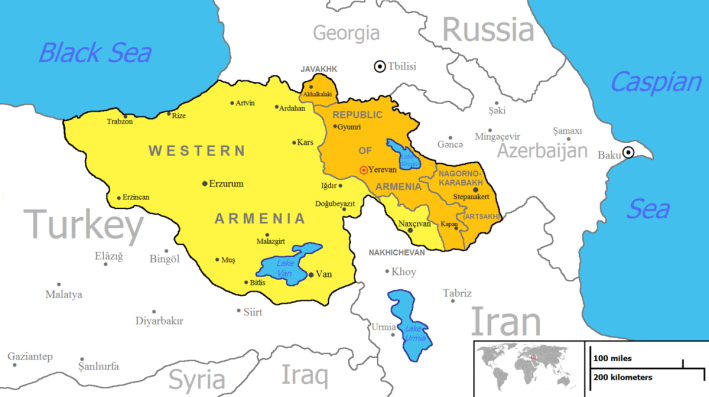
As soon as the unprovoked attacks began, Armenians in diaspora rose up to protest, fundraise, and shed light on the humanitarian crisis unfolding in our homeland. Being of diaspora during those first few days was excruciating. I kept trying to explain to my non-Armenian friends that I felt completely disassociated from my body. I could barely eat or sleep; I certainly couldn’t focus on my work either. All I could do was glare at my phone for updates from Armenia, staying up until 4 AM to match Armenia’s 11 plus hour time difference.
After a week of watching missiles and bombs deliberately destroy civilian structures like homes, schools, and maternity hospitals, it felt like my own heart was exploding inside of my chest. On top of these heinous war crimes, the international community was by and large silent.
Any sliver of reporting catered to violent “both sides-isms,” as if being “objective” in the face of one-sided aggression makes one “neutral” or a “good journalist.” Despite being presented with clearly documented war crimes committed by the Azerbaijan armed forces, international humanitarian institutions were also largely unbothered. This reveals these institutions’ deep moral bankruptcy and demonstrates the success of intensive psychological warfare, gaslighting, and propaganda being waged against Armenians globally.
Our cries for attention and advocacy went ignored. One week into the heavy shelling, on October 5th, I joined a group of Armenian protestors who had blocked off Sunset Boulevard in front of the CNN building. There I danced yarkhushta (an Armenian martial dance) to protest their lack of appropriate coverage. Two days later, I was on a plane to Yerevan, Armenia, with several suitcases full of medical supplies for Armenian defenders and high-tech camera equipment for local Armenian journalists who are all on the front lines fighting for survival and documenting it for the world to see.
So as an Angeleno, why should you care? Well, L.A. Armenians are many; if you live in L.A., you probably know this. You might have noticed Armenian Angelenos blockading freeways and protesting in front of consulates and news agencies with tri-colored Armenian flags. You’ve maybe visited our pastry shops, eaten fresh lahmajun, had a ponchik, shopped at a small market, or maybe your mechanic or coworker is Armenian.
You might not know that more Armenians live outside of Armenia proper today than there are inside the country (10 million to 3 million, respectively). This is mainly due to Turkey’s mass dispossession and genocide campaign over 100 years ago, acts that are mostly unrecognized today.
For us, this aggression against Armenians in our ancient homeland is an extension of this mass extermination project. Armenia’s hostile Turkic neighbors—Turkey and Azerbaijan—are dictatorships rife with anti-Armenian sentiment. Put simply, they want Armenian lands without Armenians on them, and they’ve been preparing for this large scale attack for decades.
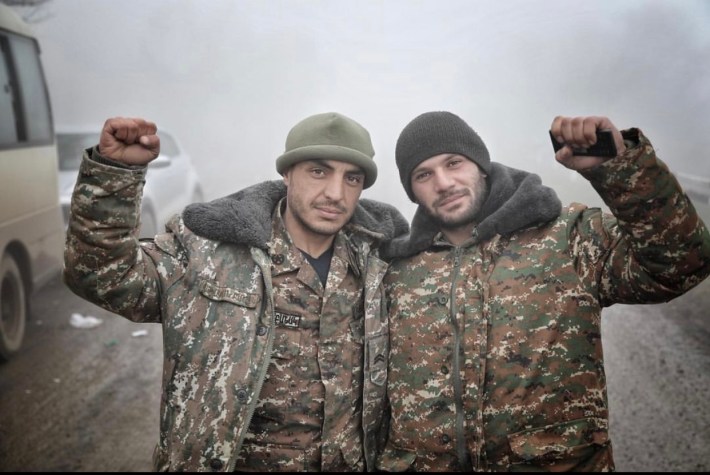
For Armenians, this is not just a war over territory, and our soldiers are not what most in the west understand to be “career soldiers.” The Armenian Army is made up of artists, students, musicians, and farmers (many of whom are volunteers) who are all giving up their lives to protect our lands. Any Armenian will tell you that this is an existential struggle for survival. A survival that was once already violently threatened by Turkey and continues to be to this day. How terrifying and traumatic to realize that the descendants of genocide perpetrators are aiming to repeat a history they couldn’t finish. A history that has been denied and revised in both Azerbaijan and Turkey for decades.
Of Artsakh
For 44 days, the Armenian people fought against Turkish Bayraktar TB2 drones; Israeli Kamikaze drones; the massive Turkish and Azeri military budgets worth tens of billions of dollars; oil money and bribes; US imperialist ambitions; COVID-19; mercenary fighters, and the silence and complicity of the west and its “humanitarian” institutions. A tiny, impoverished, landlocked country of dispossessed people recovering from decades of corrupt oligarchic rule and Soviet colonialism lost Artsakh’s indigenous lands.
The Armenian people held off some of the most advanced military weaponry on the planet with 20th-century kalashnikovs and pure will.
We lost, but this sinister war should have never started in the first place. We lost because Artsakh was a testing ground for future 21st-century military warfare and weaponry. We were lab rats and research subjects for the military-industrial complex (CEOs: US and Israel).
According to Turkey, the second-largest military force in NATO, this war wasn’t meant to last more than four to five days. They expected to take Artsakh entirely in less than a week. The Armenian people held off some of the most advanced military weaponry on the planet with 20th-century kalashnikovs and pure will.
This loss numbs Armenians all over the world. Not only of the loss of land but of the loss of life. An entire generation of young people gave their lives and showed us what unbelievable courage and love look like. Love for our people, our lands, and our future--knowing good and well that they might not be here to witness is with us.
Now we are witnessing a mass exodus of Armenians from their ancestral lands. 100,000 Armenians from Artsakh are now homeless. Our sacred churches and sites are now in the hands of Turks and Azeris who have historically committed cultural genocide, erasing and desecrating traces of Armenianness on our own lands. This will be Artsakh’s fate too.
The same dispossession and displacement of Armenians that our parents, grandparents, and great grandparents would tell us about are happening again, in real-time. Armenians, forced to surrender their land, are burning down their own homes. A powerful and devastating symbol of protest and resistance, so that they at least do not have to gift the homes they have been living in for generations to Anti-Armenian settlers.
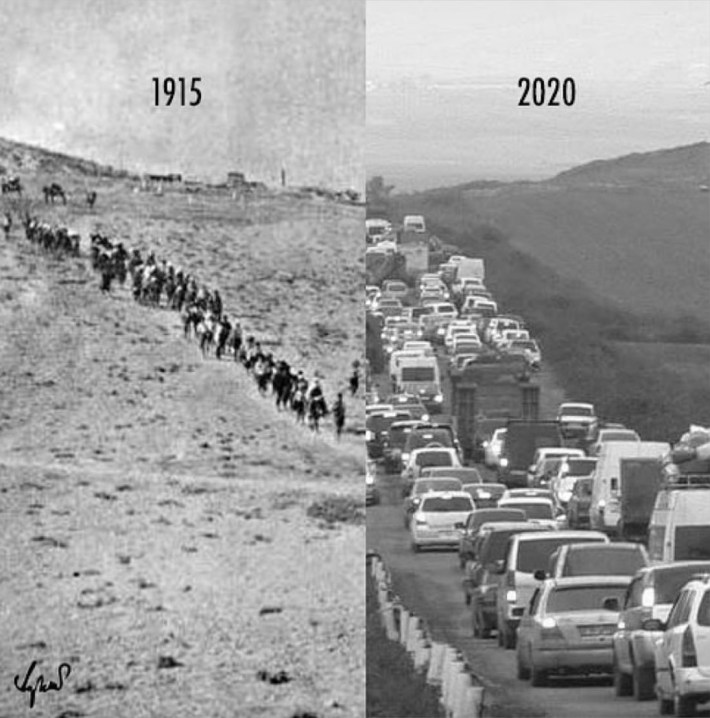
of Los Angeles
Born and raised in Tonvaangar (the Los Angeles basin), I recognize that Indigenous peoples, including but not limited to the Tongva, the Chumash, the Acjachemen, and the Tataviam, are the original and rightful stewards of this land. I acknowledge that I live on stolen land acquired through genocide and state-sanctioned cultural erasure.
As an Armenian, I am not unfamiliar with these realities. Not only do I understand these to be historical truths, but I also profoundly empathize with my Indigenous siblings because I see their stories and their reality converge with my own family history of genocide and dispossession. Beyond this, I also recognize how the United States and Turkey share settler-colonial tactics. Both countries rely on historical revisionism and cultural erasure to justify their settler projects, ensuring that no such trace of their respective Indigenous populations remains. Furthermore, the United States is also built on stolen labor, characterized by the violent uprooting and enslavement of African peoples stolen from their homelands.
As an L.A. Armenian, this is why my struggle for liberation is inclusive, expansive, and critical.
My main point here is that these were not events; they never ended. They are ongoing processes that continue to unfold and morph in new and insidious ways.
Genocide, then, like settler-colonialism or chattel slavery, are all examples of ongoing violence that never actually had an end date. The Armenian genocide and the ethnic cleansing of Armenians in Azerbaijan never ended, as the assault on Artsakh is a direct continuation of decades-long state-sanctioned projects of anti-Armenian hatred, violence, dispossession, and erasure in both Turkey and Azerbaijan. The genocide of Indigenous peoples of Turtle Island never ended, as consistent infringements on Indigenous sovereignty, the countless missing and murdered Indigenous women, and the erasure of Indigenous cultures and peoples are daily realities for Indigenous peoples on their own lands. Slavery and anti-Black racism never ended, as systematic economic marginalization, mass incarceration, and violent U.S. policing continue to define the Black experience in America.
Each of us continues to endure varying iterations of oppression wielded by the same respective oppressors to this day. Until Pan-Turkic expansionism, U.S. settler colonialism, and White supremacy mythology are dismantled, our violent histories will continue to unfold and morph in new and insidious ways.
As an L.A. Armenian, this is why my struggle for liberation is inclusive, expansive, and critical.
As a daughter of immigrants, I am a guest on Indigenous land. Therefore it is my responsibility to collaborate with, learn from, and support my Indigenous siblings to fight for self-determination on their lands. As a visibly non-Black person, I also benefit from structural anti-Blackness and White-adjacent privilege. Therefore it is my responsibility to interrogate White supremacy and fight and advocate for Black safety and liberation. I believe firmly in the idea that my people’s struggle can and MUST hold space for and include all oppressed peoples’ struggles.
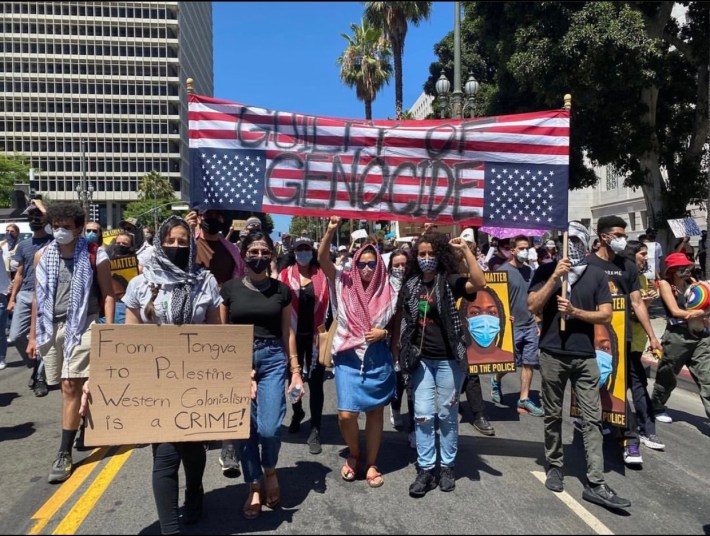
This is why solidarity matters. It asks us to consider more extensive systems and mechanisms of oppression. To see and name the connective tissues between what harms and hurts us globally versus treating injustices as separate offenses that occur in a vacuum. We must know that this is hardly ever the case. If the United States funds Israel and Turkey militarily, and Israel and Turkey provide Azerbaijan with the advanced military technology that is murdering my people. How does this not make my struggle intertwined with my Indigenous and Black siblings?
How does this reality not directly connect me to the Palestinian struggle against their indigenous lands’ Israeli occupation?
How does this reality not directly connect me to the Palestinian struggle against their indigenous lands’ Israeli occupation? We must know and believe that when Black and Indigenous peoples are free, only then will we see true liberation. It is why our fights are more similar than they are different. It is why I affirm that #BlackLivesMatter and why I call for #LandBack (and to #FreePalestine) all while I call to #RecognizeArtsakh.
Because of my own family history and because I am directly implicated in the oppression of other peoples, my duty to uplift all liberation struggles is an international and intersectional one that must also exist outside of the contours of my own identity.
So, will you speak up on behalf of the people of Artsakh?
